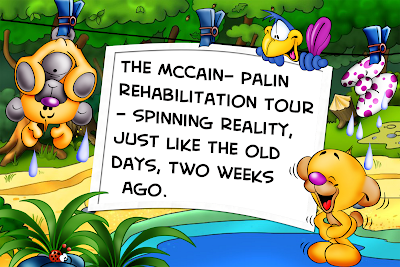 Wash. Post misrepresented Obama's remark to SF Chronicle editorial board about coal
Wash. Post misrepresented Obama's remark to SF Chronicle editorial board about coalSummary: The Washington Post distorted a quote by Sen. Barack Obama in reporting that Sen. John McCain "ma[de] fun of something Obama had told a reporter, 'The only thing I've said with respect to coal, I haven't been some coal booster.' " In fact, Obama said during a January 2008 interview: "The only thing that I've said, with a respect to coal -- I haven't been some coal booster -- what I have said is that, for us to take coal off the table as a ideological matter, as opposed to saying, if technology allows us to use coal in a clean way, we should pursue it. You know, that I think is the right approach."
In a November 3 Washington Post article, staff writers Shailagh Murray, Juliet Eilperin, and Robert Barnes cropped a quote by Sen. Barack Obama during a January 17 meeting with the San Francisco Chronicle editorial board to misrepresent what Obama had said about coal. Murray, Eilperin, and Barnes reported that during a speech the previous day, Sen. John McCain "ma[de] fun of something Obama had told a reporter, 'The only thing I've said with respect to coal, I haven't been some coal booster.' " The article went on to quote McCain stating, "My friends, I've been a coal booster, and it's going to create jobs, and we're going to export coal to other countries and we are going to create hundreds of thousands of jobs." In fact, during the Chronicle meeting, Obama said: "The only thing that I've said, with a respect to coal -- I haven't been some coal booster -- what I have said is, that, for us to take coal off the table as a ideological matter, as opposed to saying, if technology allows us to use coal in a clean way, we should pursue it. You know, that I think is the right approach."
From Obama's January 17 meeting with the San Francisco Chronicle editorial board:
EDITORIAL WRITER: Senator, you introduced a bill promoting coal-conducted fuels, and then you said you'd only support them if they emitted fewer greenhouse gases in gasoline. Now, all the scientific evidence points to coal being dirtier than pretty much anything else, so how are you going to score your support for coal with the need to fight global warming?
OBAMA: Well, I've already - I've already done it. You know, I voted against the Clear Skies bill -- in fact, I was the deciding vote. Despite the fact that I'm a coal state, and that half of my state thought I'd thoroughly betrayed them, because I think clean air is critical, and global warming is critical. But, this notion of no coal, I think, is an illusion. Because the fact of the matter is, is that, right now, we are getting a lot of our energy from coal, and China's building its coal-powered plant once a week. So, what we have to do, then, is we have to figure out how can we use coal without emitting greenhouse gases and carbon, and how can we sequester that carbon and capture it? If we can't, then, you know, we're gonna still be working on alternatives. But --
EDITORIAL WRITER: Alternatives including coal, or what?
OBAMA: Let me sort of describe my overall policy. I mean, what I've said is that we would put a cap-and-trade system in place that is more - that is as aggressive, if not more aggressive, than anybody else's out there. I was the first call for a 100 percent auction on the cap-and-trade system, which means that every unit of carbon or greenhouse gases was emitted would be charged to the polluter. That will create a market in which whatever technologies are out there that are being presented, whatever power plants that are being built, that they would have to meet the rigors of that market and the ratcheted-down caps that are placed -- imposed every year.
So, if somebody wants to build a coal power plant, they can. It's just that, it will bankrupt them because they're going to be charged a huge sum for all that greenhouse gas that's being emitted. That will also generate billions of dollars that we can invest in solar, wind, biodiesel, and other alternative energy approaches. The only thing that I've said, with a respect to coal -- I haven't been some coal booster -- what I have said is, that, for us to take coal off the table as a ideological matter, as opposed to saying, if technology allows us to use coal in a clean way, we should pursue it. You know, that I think is the right approach.
The same with respect to nuclear. Right now, we don't know how to store nuclear waste wisely, and we don't know how to deal with some of the safety issues that remain, and so it's wildly expensive to pursue nuclear energy. But, I tell you what, if we could figure out how to store it safely, then I think most of us would say that might be a pretty good deal. The point is, if we set rigorous standards for the allowable emissions, then we can allow the market to determine, and technology and entrepreneurs to pursue what's the best approach to take, as opposed to us saying, at the outset, here are the winners that we're picking, and maybe we pick wrong, and maybe we pick right.
From the Post article:
Although McCain's pitch to voters in his final days focuses primarily on the theme that he is more experienced and would manage the economy better than Obama, he has also increasingly shifted to the right in recent weeks as he courts voters in swing states.
In one of the clearest indications of that move, the candidate who once spoke repeatedly of the need to curb climate change now devotes his speeches to touting the need to boost oil and coal production, two of the biggest contributors to global warming, while campaigning in those coal-producing states.
Indeed, the one new line he unveiled Sunday -- which his aides said he would use several times during his seven-state swing in the run-up to Election Day -- was to make fun of something Obama had told a reporter, "The only thing I've said with respect to coal, I haven't been some coal booster."
Speaking before a crowd in Scranton, McCain said, "My friends, I've been a coal booster, and it's going to create jobs, and we're going to export coal to other countries and we are going to create hundreds of thousands of jobs."
— M.G.


















































